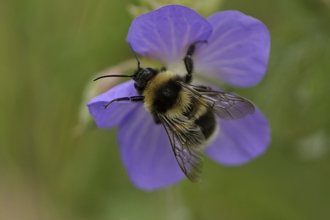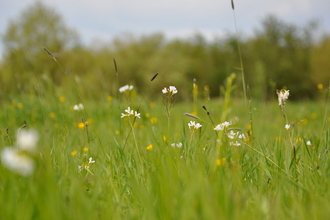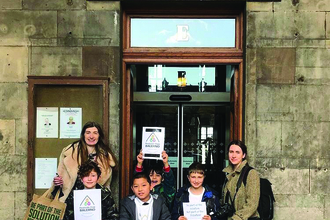How can Local Authorities support nature?
Local Authorities manage lots of areas, from parks to road verges to the grounds of office buildings and hospitals. This adds up to a huge area that could be supporting wildlife. But in cities, towns and villages across the country hundreds of tonnes of toxic chemicals are used, often several times a year, damaging the health of both wildlife and people. Many of these areas are also strimmed, leaving town centres that are tidy - but driving plants and animals to the brink of extinction.
It doesn’t have to be this way. There are lots of things that Local Authorities can do to support thriving biodiversity in urban areas. Cities, towns and villages can be great for wildlife and great for people too.
How can Local Authorities help insects?
To help councils start taking action for insects we have put together some easy, often cost-saving, ways to cover a number of policy, practical and engagement related actions. These steps can be taken in any order; the key is to get started.
Contact your local Wildlife Trust to talk through your plans. Not only can we provide help and advice; we can also help promote the actions you are taking to build public awareness and support.
1. Make a pledge: Make a public commitment to help insects and other wildlife thrive.
By making a public commitment to reducing pesticides and creating habitat for insects, you will show the public that you understand the issues and that you care. Be specific; what will you do, by when, and how will you check whether it’s been successful? By sharing this information on your website and in your newsletter, you will build public support for the changes you make. Click here to take Pesticide Action Network UK’s Pesticide-Free pledge.
2. Get informed: Seek advice, train your staff - fill your ranks with experts
Actively training council staff to understand the importance of supporting insects gives all departments the opportunity to play their part.
You can empower your staff to make a difference by:
- Identifying key roles and responsibilities
- Identifying your experts, sharing knowledge and filling knowledge gaps
- Designating insect champions
- Encouraging staff to raise opportunities for insect recovery
Conservation experts such as your local Wildlife Trust or natural history society can provide advice and support and may be able to offer personalised training for staff.
3. Go formal: Embed insect recovery in policies, strategies and plans
Councils already have a range of environmental obligations, and many have pledged to reach net zero in coming years.
Insect recovery should be embedded in ALL relevant policies, strategies and action plans, not only biodiversity and climate change strategies, pollinator action plans, land management plans and local plans addressing local development. Policies should include both a target for pesticide reduction and a target for insect-friendly habitat creation, restoration and protection. Where possible, it can be best to update existing strategies to ensure they address insects.
All policies, no matter their topic, should be assessed to ensure that they will not have adverse impacts on the area’s natural resources. Pesticide Action Network UK are able to provide guidance and advice on how to form these policies and plans to switch to non-chemical alternatives. Contact them through pesticide-free@pan-uk.org
4. Go wild: Designate some areas to leave wild and just let things grow!
One of the best low-cost, low-effort ways to support biodiversity is by leaving areas to grow wild in parks, gardens, verges, allotments, industrial estates and hedgerows. You can increase public support by adding signage to show it’s intentional. Seeing what grows naturally is a great way to see what species might thrive under a less intensive management regime, giving you options to cut back on maintenance costs on a bigger scale.
5. Join things up: Create wildlife corridors by managing road verges for nature
There are around 300,000 miles of road verges across the UK, which are home to almost half of the UK’s wildflower species, a vital habitat for pollinators. If managed for wildlife while keeping road safety in mind, road verges can become a key part of a national Nature Recovery Network, joining up vital habitats for wildlife.
While some road verges need to be cut for driver and pedestrian safety, many can be left to grow for longer and cut later in summer when insects have benefitted from the nectar and pollen.
Your local Wildlife Trust can give advice; we work with highways authorities, councils and landowners to advise and help manage road verges.
6. Cut the chemicals: Stop all routine use of pesticides on public land
A significant reduction in pesticide-related harms across the UK is required to reverse insect declines, improve human health, and secure a wilder future. Failure to act could risk not just our food security, but widespread ecological collapse.
Many councils have driven significant reductions in use and even gone pesticide free in some areas. We recommend the following steps to going pesticide free.
- Conduct an audit of what you currently use.
- Commit to only using pesticide as a last resort, rather than a standard, across the whole estate.
- Use green flag award criteria to drive down pesticide use while promoting your green spaces.
- Trial a pesticide-free approach on a specified area.
- Set an ambitious target and phase out pesticide use over 3 years.
Pesticide Action Network UK has a wealth of resources on how councils can go pesticide free, what alternatives can be used, phase-out plans, and case studies of what has worked for councils to date here.
7. Make space: Create and restore insect-friendly habitat
Wildlife can make a home in a huge variety of places. By looking at your existing urban and greenspace, you can identify space to create or restore insect-friendly habitat. These could be flowerbeds, window boxes, parks, allotments or expanding larger buffer sites. Wildlife can be incorporated into many aspects of town infrastructure, such as green walls and rooves, and flowerbeds in road calming measures. You can reduce costs and support native species by opting for native perennial plants rather than annual bedding plants.
8. Spread the word: Promote public awareness and engagement
Public awareness-raising activities are key to the success of reducing or ending pesticide use. By telling people what you’re up to and why, it builds public support for the changes you are making as well as encouraging others to take part.
You can spread the word by:
- Telling the public what you’re doing with signage, newsletters etc.
- Encouraging the public to sign up to our campaign and receive their own free, downloadable action guides.
- Encourage Schools and educators to download our Action for Insects School guide.
- Promoting citizen science projects such as Bugs Matter to help people learn about insects and collect valuable insect population data.
- Working with local ‘Pesticide-Free Towns’ campaign groups to understand the needs of local people.
9. Help others: Support other land managers to take action too
As well as taking action for insects on their own estates, councils can amplify their impact by supporting other land managers to take action too. Universities, shopping centres, hospitals, local businesses and transport operators can all play a valuable role, taking action to reduce pesticide use and create insect-friendly habitat.
Councils can help by:
- Incentivising target setting.
- Running a pesticide amnesty to help landowners dispose of illegal or unwanted chemicals.
- Supporting tenant farmers to adopt Integrated Pest Management.
- Promoting what local landowners are doing.
- Drawing together a stakeholder group of land managers to discuss what action they could take and what support they would need?
For more detailed information and resources, download ‘Action for Insects: A guide for local authorities’ and Pesticide Action Network UK's ‘Going Pesticide-Free’.



